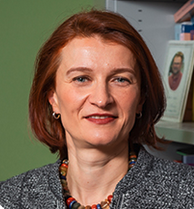Advanced age increases frequencies of de novo mitochondrial mutations in macaque oocytes an somatic tissues
Le 08 Avril 2022
11h30 - Hybrid -online & Salle SC01, Bât. 23, Univ. Montpellier

Kateryna Makova
Penn State University, US
Link to seminar: https://umontpellier-fr.zoom.us/webinar/register/WN_ohvU-hd-QvKKILfFM8A4PQ
Summary
Mutations in mitochondrial DNA (mtDNA) contribute to multiple diseases. However, how new mtDNA mutations arise and accumulate with age remains understudied because of the high error rates of current sequencing technologies. Duplex sequencing reduces error rates by several orders of magnitude via independently tagging and analyzing each of the two template DNA strands. Here, using duplex sequencing, we obtained high-quality mtDNA sequences for somatic tissues (liver and skeletal muscle) and single oocytes of 30 unrelated rhesus macaques, from one to 23 years of age. Sequencing single oocytes minimized effects of natural selection on germline mutations. In total, we identified 17,637 tissue-specific de novo mutations. Their frequency increased ~3.5-fold in liver and ~2.8-fold in muscle over the ~20 years assessed. Mutation frequency in oocytes increased ~2.5-fold until the age of 9 years, but did not increase after that, suggesting that oocytes of older animals maintain the quality of their mtDNA. We found the light-strand origin of replication (OriL) to be a hotspot for mutation accumulation with aging in liver. Indeed, the 33-nucleotide-long OriL harbored 12 variant hotspots, 10 of which likely disrupt its hairpin structure and affect replication efficiency. Moreover, in somatic tissues, protein-coding variants were subject to positive selection (potentially mitigating toxic effects of mitochondrial activity), the strength of which increased with the number of macaques harboring variants. Our work illuminates the origins and accumulation of somatic and germline mtDNA mutations with aging in primates, and has implications for delayed reproduction in modern human societies.
Watch previous seminars on our YouTube channel: https://www.youtube.com/channel/UCrX4IsZ8WIFcDa0ZmC7rcQg
Contact:
Contact: ignacio.bravo@ird.fr
Contact du Comité SEEM: seem@services.cnrs.fr. Contact du Labex CEMEB: cemeb-gestion@umontpellier.fr


